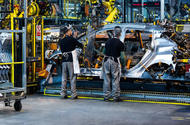UK car manufacturing directly employs 182,000 people, while the whole industry accounts for almost 782,000
Thousands of jobs could be at risk if the government doesn’t act on the UK car industry’s calls for help
Last year, 8.2% of the 705,826 cars made in the UK were electric and a further 17.9% hybrid. The remaining 73.9% were either petrol or diesel.
That, in the most simplistic of terms, tells you all about the steepness of the challenge faced by the car industry to get ready for global ICE cut-offs, starting in earnest in 2030 – and even then assuming that all hybrids will live on, rather than just plug-in hybrids.
It’s also part of the reason why you will hear increasingly desperate calls for support for the EV transition, now seven and a half years away. They will come from industry bodies like the Society of Motor Manufacturers and Traders but also from industry leaders past and present, with senior high-ups such as ex-Aston Martin boss Andy Palmer (never a man to shy away from saying what he thinks) laying down what they see as necessary with increasing alacrity.
The risk is that the messages they convey are dismissed for their vested interests or because they’re seen as having an affinity for an industry that has served them well. While there’s undoubtedly a strong truth to that, there’s also a truth to the fact that unless positive action is taken quickly, much of the industry we have today will quickly be forced to either restructure beyond recognition or go out of business.
Why so? Because (at the time of writing) 80% of cars made in the UK are exported, 55% to the EU, with which we have agreed increasingly strict rules of origin, essentially boiling back to us manufacturing EV batteries here or having an industry so far on the back foot that it would be highly unlikely to ever be able to operate competitively in a global market.
As exclusively reported by Autocar Business last week, these rules played a part in British battery firm Eurocell’s decision to establish a £1.65bn factory in the Netherlands rather than the UK.
So far, with only a couple of notable exceptions, the UK’s plans for battery factories lag far behind those of other countries. Given the scale of the investment needed and the timescales to go from concept to production, we’re probably months, maybe a year, from sleepwalking our industry into an enforced contraction from which it may never recover.
Why does it matter? Statistics provided by the SMMT and requoted by government (and therefore, you would hope, reliable) suggest that the car industry is turning over £67 billion per year, investing £3bn in R&D and exporting goods worth £77bn – about 10% of the value of the UK’s exports of everything in a year. Manufacturing directly employs 182,000 people, while the industry as a whole, from the supply chain to retailing, employs almost 782,000.
Given what’s at stake, increasingly desperate calls for support need to be heard. When it was all going well, government ministers were queuing up to be associated with the car industry, but it’s now when the chips are down that they can make a real difference.
Source: Autocar
